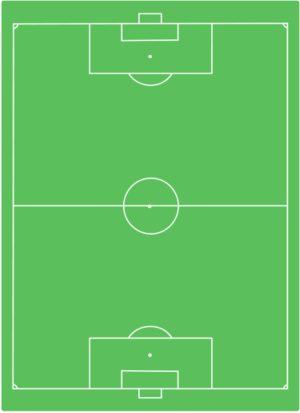HNK Hajduk Split
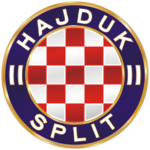 |
||||
| Full name | Hrvatski nogometni klub Hajduk Split | |||
|---|---|---|---|---|
| Nickname(s) | Bili (The Whites) Majstori s mora (Masters from the Sea) |
|||
| Founded | 13 February 1911 | |||
| Ground | Gradski stadion u Poljudu (Capacity: 35,000) |
|||
| Chairman | Joško Svaguša | |||
| Manager | Stanko Poklepović | |||
| League | Prva HNL | |||
| 2009–10 | Prva HNL, 2nd | |||
|
||||
HNK Hajduk Split is a Croatian football club, one of the two most popular football clubs in the country.[1][2] Hajduk is based in the city of Split, Croatia.
Their nicknames are Bili and Majstori s mora. Hajduk is one of the most successful teams in the former Yugoslavia and Croatia, having won 9 Yugoslav First League titles, 6 Prva HNL titles, 1 Banovina of Croatia title, 1 Socialist Republic of Croatia title, 5 Croatian Cups, 5 Croatian Supercups and 9 Yugoslav Cups.
The team's traditional home colours are all-white. Hajduk Split's home ground is the 35,000-seater Poljud football stadium in Split, where it has played since 1979. Hajduk Split holds long-standing rivalries with other football clubs, most notably Dinamo Zagreb, with matches between the two teams referred to as "Eternal derby".
Contents |
History
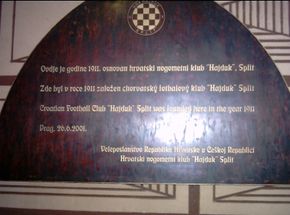
The club was founded in the famous, centuries-old pub U Fleků in Prague (then also part of the Austro-Hungarian Empire) by a group of students from Split: Fabijan Kaliterna, Lucijan Stella, Ivan Šakić and Vjekoslav Ivanišević. They attended the pub following a match between AC Sparta and SK Slavia and decided it was time their own town founded its professional club. They all knew how popular the sport was in Split (their home), and how well their friends there played.
The club was officially registered with the authorities on February 13, 1911. The name originates from the hajduks, romanticized bandits that fought the Ottoman Turks. The founders subsequently designed the club's emblem, and a group of Catholic nuns from a monastery in Split created copies which were distributed to fans.[3]
Hajduk gathered the pro-Croat party of citizens of Split, Croat unionists or puntari. That is why the club specifically has the name "hrvatski nogometni klub" (Croatian football club) and has the Croatian crest in its logo. The club itself was against the Austro-Hungarian government's policy of not allowing the unification of Croatian provinces and keeping them separated (the government and the emperor did not allow the reunion of Dalmatia with the rest of Croatia).The first opponent was "Calcio Spalato", the club unionist party who lived in Split, and the match ended a score 9:0 (6:0) for Hajduk. The first hit to his knee Hajduk scored Sime Raunig. 1912th year, Hajduk was first performed, in Zagreb against the football club "HASK" and lost 3-2. 1923, Hajduk was the first time he played in a league of Yugoslavia, but did not record high scores. Higher reputation with his first real results, the club has made defeating the Olympique Marseille with a 3-2 in his first international match. It was a tour of North Africa. After the success of the team in Split, Hajduk was the first time became the main topic of conversation, and the team return home from tour, they were greeted by almost all residents of the city at the foot of Marjan. Hajduk reached its first period of glory in the late twenties, when it won two Yugoslav championships, breaking the domination of clubs from Belgrade and Zagreb. Particularly interesting is the club's war episode. After the Italian occupation of Split during World War II, the club ceased to compete in defiance, and declined an offer to join the Italian first division, which included the incentive of a new stadium being built by the authorities and presented to the club free of charge.
The temporary ban on work
During sixth january dictatorship to the Kingdom of Yugoslavia, the adjective Croatian was forcibly replaced by the adjective "Yugoslav". Through the Italian occupation of Split, 1941. - 1943., Hajduk refused to compete in an alien (Italian) championship. After the arrival of Split under the authority of the NDH, things are not changed. Although they launched the initiative for inclusion in the HNK Hajduk Split Cup NDH, NDH authorities with the previous trading Croatian territories (mainly the Split and the Dalmatian coast), resulted in the rejection of Hajduk people to participate in the championship NDH. In 1944, the team and staff clandestinely joined Josip Broz Tito's Yugoslav Partisans on the island Vis and continued to play as an official Partisan army team. With its proficiency and its unique Dalmatian spirit, the club reportedly impressed the Partisan commander and future Yugoslav president, Marshal Josip Broz Tito. He officially invited Hajduk to move to Belgrade and become an official Yugoslav People's Army (JNA) team. However, Hajduk's players refused this offer and continued playing in their hometown, Split. The club, however, continued to enjoy the reputation of "Tito's favorite" long after the war.
The period after the war
After World War II Hajduk continued to play in the Yugoslav championship and Cup. 1946. they won Croatian championship and established the magazine "Journal of Hajduk. 1948. - 1949. Hajduk has visited Australia and became the first team from Yugoslavia who played on all continents. 1950. The club won the championship without dropping a meeting of Yugoslavia, which is a record that so far no one from this area has not crashed. That same year, before the decisive match against Red Star (2-1 win) was established fan organization Torcida (named after the Brazilian fans), and became the first organized group of supporters in Europe. The following year the reconstructed stadium "Stari plac". Later on Hajduk beat Red Star Belgrade in the mid of Belgrade of the 4:1, but the "red and white", however, emerged as champions. Starting next season, things like that. This time the actors were Vladimir Beara and Bernard Vukas who are late to prepare national team for 30 minutes, you get a month-long ban on the occurrence of the club. Without these essential players Hajduk lost the match, while Dinamo takes the Cup. All this prompted the club legend Frane Matošić a to storm the session NSJ's attacking them and saying, "Do you have a gram bar of honesty?". 3rd April 1955. in Zagreb, Hajduk beat Dinamo 6:0, which is the biggest win in the derby's two largest Croatian club. 1955th won the championship, but the meanness that made the Football Association of Yugoslavia, Hajduk was the champion sent to the Central European Cup, while the first edition of the European Cup sent to Belgrade Partizan.
The biggest club
Since 1970. until 1980. Hajduk had its best years in SFR Yugoslavia. The "Zlatna generacija" ("Golden Generation") won five consecutive cups and three championships in the 1972 to 1979 period. It was the third most successful club in Yugoslavia far outstripping the fourth, its present day rival, NK Dinamo. 1971. Won the title after 16 years, with win in Belgrade, again, with over Partizan 4:3 after they lost with 0:3. At that time they played Petar Nadoveza (who finished his career at the beginning of the decade), goalkeeper Ivan Katalinic (later a successful coach of the team), Dragan Holcer, Jurica Jerković, Luka Peruzović, Vilson Džoni, Brane Oblak, Dražen Mužinić, Ivica Šurjak, Ivan Buljan, Slaviša Žungul and upcoming stars were the brothers Zoran Vujović and Zlatko Vujović , and others. There was the world-famous coach Tomislav Ivić , who won three championships and 4 Cup presenting very nice football. According to the coach, Hajduk had already practiced the game with a right-handed as left-wing and left-handed as right, what today is the current European champion Barcelona, and the president was the famous Tito Kirigin, considered the greatest president of all time Hajduk. With great success in domestic competitions (9 trophies in 10 years), in international competitions, there was a semi-final[ [Cup Winners'Cup]] season 1972./73. when Hajduk was lost by the English Leeds United, and from 1980. remembers the "mythical" meeting with HSV, when after great struggle on the Poljud , HSV (then one of the best teams of Europe) passed away due to the goal away. Recorded and 5 consecutive cups from 1972. until 1977. 1976. when Partizan by refree Maksimovic won, Hajduk he has inflicted the biggest defeat of even 6:1. In 1979. Hajduk moved to the new stadium Poljud, then one of the most beautiful sports buildings in the world. The last goal of the "Stari plac", scored Miso Krstičević. However, according to the findings in the 80's there were rumors of a kind curse of Poljud beauty. Hajduk restored its traditional emblem including the Croatian chequy and removed the red star from it.[4]
80s and have been offered less success in the country (no title), although it is considered that the Hajduk up to and including 1985/86 season. should win at least two titles. Some time ago a Croatian emigre press, and local Croatian press, however carefully chosen words, he spoke about the strange outcomes match Hajduk rival for the championship, where they are individual guest passed without problems. Moreover, against Hajduk in these fields is played by the philosophy of "break him a leg!" (Literally savage case starts, in which a broken leg Blaz Sliskovic in the match against Partizan Belgrade and later Nenad Gračan against Rijeka, in his third match for Hajduk!). Of all the European competitions remember the semi-finals in the UEFA Cup in 1984. when it was still weird English club, and an old acquaintance of Tottenham, and the quarterfinals of the same competition two years later. Successes abroad compensate for the failures at home, and during that decade Hajduk win teams like Valencia CF, FC Bordeaux, FC Metz,VfB Stuttgart, Torino F.C.,Olympique de Marseille and Manchester United (whose defeat in a friendly match on Poljud one of the biggest guest in the history). Prominent players 80s were Blaz Sliskovic, the popular "Grandma", Zoran Vulic, Aljosa Asanovic, and Ivan Gudelj is forcibly interrupted due to illness, a very promising career.
8th May 1991. Hajduk won the Yugoslav Cup final, defeating, as an outsider, in the middle of Belgrade, former European champions Red Star with 1:0. Goal scored Alen Boksic. Weight of this success is that it is the season in the fall of the championship was in last place, which is the worst season was inconceivable for the clubs "big four", while a Red Star of the season was superior in the championship, at the same season was also winner of European Cup.
Hajduk is famous for its youth school. It is one of the most prolific producers of high quality footballers which often continue careers in famous European teams. Some of Hajduk's former players include: Alen Bokšić (ex Juventus, Lazio, Middlesbrough), Robert Jarni (ex Juventus, Betis, Real Madrid), Slaven Bilić (ex Karlsruhe, Everton), Igor Štimac (ex West Ham, Derby County), Milan Rapaić (Perugia, Fenerbahçe, Standard Liege), Igor Tudor (Juventus), Ivica Šurjak (ex Paris SG), Luka Peruzović (ex Anderlecht), Aljoša Asanović (ex Derby County, Panathinaikos), Ivan Buljan (ex Hamburger SV) and Zlatko Vujović (ex Bordeaux).
When the Croatian national team won third place at the 1998 World Cup in France, amongst the first 11, there were 5 former Hajduk players.
Before that, Hajduk played its games at the "Kod stare plinare" stadium ("By the old gas facility"), also known as "Stari Plac Stadion" ("Old Square") or "Staro Hajdukovo" ("Old Hajduk's"). Before the transformation that area into the football pitch, the area was known as "Kraljeva njiva" ("King's Field") and it was part of a military camp.
Hajduk is by far the most popular sport team in the Croatian region of Dalmatia. Hajduk also has a strong fan base throughout the rest of Croatia, especially in litoral areas, as well as in Slavonia. Hajduk is also a very important part of the region's identity.
Outside of Croatia, Hajduk also has many supporters throughout the rest of the world. It is said that Hajduk has never played a single game anywhere in the world without at least a small group of Torcida in the stands. Countries with huge fan clubs membership include Brazil, Chile New Zealand, Australia, Switzerland, USA and Canada - mostly countries with significant Croat immigration from Dalmatia.
Hajduk in HNL
In the first four years of HNL Hajduk becomes far more successful than rivals from Zagreb won three league titles, as well as electing and performance in the Champions League quarter-finals. However, as the team was a great complex, so the club was poorly managed financially, and at that time he was blocked account, which is still a huge burden. For the next five years Hajduk Split spent in the shadow of wealthier and politically privileged rivals from Zagreb, and the Champions League was no longer there. From the Champions League to the 2000th has not won a single trophy. After the failure of the domestic and international scene fans began to seek dismissal of administration, and circulated the story about the possible privatization of the club, which at that time did not happen. While Croatia(today Dinamo) has won titles Hajduk had problems with the registration of players for the League. Dissatisfaction with the fans has been growing, so much that they broke into the premises of the club. Later, as president, initially only six months comes the Split Port Authority director Branko Grgić.
Dinamo no longer had so much support as before, so expect much more equal between two clubs. In Europe, however,Hajduk was not as successful. In addition to passing against the weaker teams lost mainly from the first bit harder obstacles like Wisla, Fulham and Mallorca. Still, 2001. stopped Croatia series and were champions again, but in January next year on a wave of optimism Grgić promises three titles in five years. However, the main and most serious obstacle to such an adventure was referred to the financial condition of the club, which several times led club to the precipice of bankruptcy and complete collapse.
Before the 2003-04 season the director became Igor Štimac, who, with the promise of the title, Cup and Champions League, selling a couple of important players and brought those who were not much help. Professions defended statements due to lack of money you would not have to improvise somehow held on club feet. In the championship but won 2 titles, but with the game and the competition that no one is thrilled, while in Europe has become too strong and Irish amateur club. In January 2005. Hajduk bought the captain and icon of Dinamo, Niko Kranjcar, while at the end of the season and a great Dinamo coach Miroslav Blazevic.
Big announcements entered the season that was painfully exposed all the flaws unplanned leadership team. Hajduk barely finished fifth without Europe the next year, with the rotation of the huge number of players of dubious quality. Changed, with 3 coaches, and Igor Stimac has left the sports director. After the season, the club has 19 players left, and coach Luka Bonacic decided to go a few days before the start of the summer preparing. Zoran Vulić was returned , and has several experienced players. Grgic was talking about the season "without the imperative of the title," which should be only for the next uigrati where the assault on the championship and the big breakthrough in European competitions. Autumn is a part of the most successful previously, but the couple derby at Maksimir roughly down all the optimism of the masters "and the club went back into apathy. Repeatedly changing a large number of players and coaches, plan for next season is again different, and yet once again declared a failure. The administration was pompously challenged former stars such as Alen Bokšić and Ivica Šurjak who should be the guarantee of a better future.
The following is selling off players in the Maksimir stadium, and the purchase of big stars such as Tudor and Cernat on Poljud. There was no coordinated teams from last season, but is entered in this extremely optimistic. Obviously, this optimism did not last long. Completely changed the team was unable to quickly sort which has been blamed for coach Ivan Pudar and between the two games with Sampdoria was fired. Such a management team led to a repetition of the bad results that have caused the final decline Branko Grgic 23rd September 2007.
Former the Croatian and European club great lack of funds left in the mud, bad gaming staff, ignored and never worse guided apprentice, managers interfering in the team and incapable of the profession, without any plan for the future, and miles away behind the Dinamo. As a new solution, even 4 months after coming Grgić former basketball player Željko Jerkov which is served as president just 44 days. After his departure the club has allowed transformation into joint-stock company, which should be finished later this year. After two years Hajduk was again fifth in the championship, but the only trought (lost) Cup finals Hajudk has enter into Europe next season.
14th June for a new president is elected former club lawyer Mate Peroš. He once again changed the entire professional staff, but this time the president has not used the cancellation after the first crisis resulted, causing the first victory in the Maksimir (2:0) after 5 and a half years, and the first with more of a one goal difference after the 48th full years. Hajduk finished that season on 2nd place behind Dinamo Zagreb and played the final of Croatian Cup. On beginning of the new season Hajduk became join stock company with Joško Svaguša as new president.Hajduk finished that season on the 2nd place again behind Dinamo and won the Croatian Cup in the final aganist Šibenik.
Stadium
Hajduk's home ground is Poljud. It has a capacity of 35,000 and is one of the two largest stadium in Croatia.The stadium was built for the 1979 Mediterranean Games.Poljud Stadium was also a venue for 1990 European Championships in athletics. The stadium is affectionately known to the locals as the "Poljudska ljepotica" or "Poljud beauty". Its author, architect Boris Magaš, was chosen among 20 other bids in 1975. architectural competition. The largest crowd was recorded 1980 at a match against Hamburg SV–52,000 people. Two years later, after the stadium was fully completed its capacity increased to 62,000 spectators at a derby against Dinamo Zagreb. From 1911-1979. Hajduk played games on stadium called "Kod stare Plinare", where today their games play RK Nada. Stadium first name was "Kraljeva njiva". Since Hajduk moved on Poljud, old ground in speech is called in Split called "Stari Plac" or "Staro Hajdukovo". It also hosted a match between Yugoslavia and Netherlands in the UEFA Euro 1972 qualifying tournament. Stadium was located near the hospital. On the north stand the stadium there was a group of supporters Torcida. On him was played 3148 games, scored 9542 goals and won 11 championships and 6 cups.

Crest and colors
Colors
|
|
| Hajduk's original home colours. |
Hajduk played his first game in uniform with a combined red and white vertical stripes of color, which symbolized the Croatian coat of arms. Austrian former City Council did not want to be in any way manifest Croatianism Split and did not allow club colors to be emergent Croatian tricolor. When banned tricolor went up with the red (Croatia), and blue color (more) and over them in white letters written by Hajduk.
After that, the dominant white shirt, and the main colors consist of white shirts, blue pants and blue socks, a combination that symbolizes the white sails on a blue sea. White color has become a symbol of the club because it is the team Hajduk is a popular nickname 'Bili'. Away kit consists of red and blue shirts with vertical or horizontal stripes (sometimes narrow, sometimes wide), blue pants and blue socks, and symbolizes the color of the Croatian flag. One time for the main colors mentioned combination of navy, white with blue horizontal stripes, but this is the kit worn only 2 times a goalkeeper Stipe Pletikosa.
The third kit was problematic in the election. While UEFA has not introduced compulsory registration of the third jersey, was not even there. One of the possible was the vertically striped white and red shirts as the first game. However, due to the fact that this kit resemblance to the kits of other teams (Red Star), which had a negative symbolism, it never came.
Crest
Hajduk crest of the Croatian checkerboard in a circle bordered with blue ribbon, with on each side by two vertical lines. Above checks written Hajduk Split and below. Checkerboard consisting of 25 red and white fields that are the same thickness as the blue semicircle.
The importance of vertical lines club has never officially declared. According to one version they represent the founders of Club Stella, Kaliterne, Sakic and Ivanisevic. Other allegations are that these are signs of equality, which connect the city with Hajduk Split, or that it actually quotes the name of Hajduk, given that they are at that time by spelling the names of all associations and organizations must be written in quotation marks.
Crest of the 1911th made Vjekoslav Ivanisevic,and the oldest sister of Fabian and Luke Kaliterne, Ana Kaliterna, took the drawing of the convent where the nuns manually exported 20-30 pieces. Crest first appeared in public 1926th The performance during Tijardovićeva Opera's Queen balun 'as part of scenery. Hajduk played 30 years without a crest on the kit for the first time made him the 1941st when he put the original version. After that he played a match in Bari 1944th with a red star in the middle of playing under a different name and has since been thrown out checks. After that year the kit exists only as a five-pointed symbol of freedom that stands up to the 1990th when the last Yugoslav club appearance with an old crest, with Croatian chequy field, which survives to this day. Meanwhile, reports, and other versions, with the Croatian chequy field, but with a red star in the upper arms, at the junction of wellheads. Together with the five-pointed lines are changed from the side, and instead asked the club founded - 1911, which has long been maintained and is often a subject of confusion, so the players are playing today wearing a crest with stripes, while the eastern stands colored benches made crestwith the numbers 19 and 11
Supporters
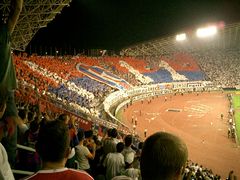
Hajduk Split's supporters, the Torcida, were formed in 28 October 1950, as they took their name after their idolized Brazilian fan groups, which are named torcidas, from the Portuguese 'torcer', to cheer on. Supporters popularly call the players of Hajduk bili (dialect for 'bijeli', plural form of white) and are the oldest organized supporters' group in Europe. Slogan fans "Hajduk live forever ", which testifies to the long and continuing tradition of name Hajduk that survived without change from its establishment until today (State and leagues have failed, "Hajduk live forever").
Torcida members and other fervent fans of the club gather in the north stand at the stadium of Poljud from where thunderous and fiercely support their club. Heart of Hajduk (Croatian: Hajdučko srce) is an annual football award established in 1994 and officially awarded by the Hajduk Split supporters' association Torcida Split to the Hajduk player of the year, e.g. the team's best performing player during the season.
Rivalries
Hajduk's biggest rivals are Dinamo Zagreb, and the matches between the two teams are referred to as "Eternal derby". Matches between Hajduk and Rijeka are referred to as Adriatic derby. Former major rivalries used to include Serbian clubs Red Star Belgrade and Partizan.
Players
Croatian teams are restricted to fielding at most six foreign players in the first eleven during the domestic league and cup matches.[5] The squad list includes only the principal nationality of each player; players who also hold Croatian citizenship are specifically noted.
First-team squad
- As of 23 August 2010[6]
|
Subašić
Oremuš
J.Buljat
Maloča
Strinić
Tomasov
Brkljača
Andrić
An.Sharbini
Ibričić
Vukušić
|
| Hajduk Split starting 11 in their 4-2-3-1 formation |
Note: Flags indicate national team as has been defined under FIFA eligibility rules. Players may hold more than one non-FIFA nationality.
|
|
Out on loan
Note: Flags indicate national team as has been defined under FIFA eligibility rules. Players may hold more than one non-FIFA nationality.
|
Former players
For details of former players, see List of HNK Hajduk Split players and Category:HNK Hajduk Split players.
Managers
Current technical staff
- As of 12 February 2010.
| Staff | Job title |
|---|---|
| Manager | |
| Assistant Manager | |
| Goalkeeping Coach | |
| Head Conditioning | |
| Club Doctor | |
| Physiotherapist |
Club statistics and records
Hajduk's first competitive game was an 9–0 victory against Calcio Spalato. Frane Matošić holds Hajduk's overall appearance record; he played 739 matches over the course of 12 seasons from 1944 to 1956. Of the current squad, Srđan Andrić has the most appearances; he played his 164th game for the club early in 2010.
Hajduk's all-time leading scorer in all competitions is Frane Matošić, who scored 729 goals at the club from 1944 to 1956. Zlatko Vujović is Hajduk's all-time leading goalscorer in European competition with 16 goals.[11]
Hajduk's record home attendance is 62,000, for a Yugoslav Championship match against Dinamo Zagreb on 1982. The record modern (all-seated) attendance is 35,000 for a match against Dinamo Zagreb on 1 October 2006.
Hajduk's 14–0 victory over Ilirija in 1931 was theirs largest league win. In Prva HNL Hajduk's largest league victory was 10–0 against Radnik in 1994, while their biggest defeat was against Varteks in 2001, 1–5. Hajduk's biggest victory in European competitions was 8–0 against GÍ Gøta in 2002 and while their heaviest defeat, 0–6, came against Ajax in 1993.[11]
UEFA club coefficient ranking
Club Ranking for 2010/2011 Euro Season (Previous year rank in italics, UEFA Club Coefficients in parentheses)
- 184
 (201)
(201)  Omonia (6.124)
Omonia (6.124) - 185
 (198)
(198) 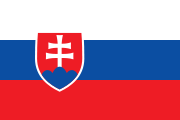 Slovan Bratislava (5.889)
Slovan Bratislava (5.889) - 186
 (189)
(189) .svg.png) Cercle Brugge (5.880)
Cercle Brugge (5.880) - 187
 (217)
(217) 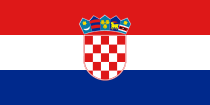 Hajduk Split (5.874)
Hajduk Split (5.874) - 188
 (175)
(175) 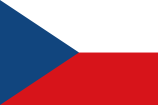 Baník Ostrava (5.770)
Baník Ostrava (5.770) - 189
 (183)
(183) 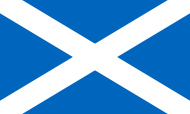 Hibernian (5.708)
Hibernian (5.708) - 190
 (214)
(214) 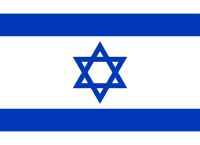 Maccabi Tel Aviv (5.700)
Maccabi Tel Aviv (5.700)
(As of 28 Aug 2010), Source: Bert Kassies website
Honours
Hajduk won two Kingdom of Yugoslavia championships, seven Yugoslav championships, six Croatian championships, as well as nine Yugoslav Cup titles, four Croatian Cups and five super cups. Abroad, the club has reached the quarterfinals of the Champions Cup (now UEFA Champions League) three times (last time 1995), and two European semifinals: Cup Winners' Cup 1973, and UEFA Cup 1984. In the following table defunct competitions are indicated in italics.
| Honours | No. | Years | |||
|---|---|---|---|---|---|
| League | |||||
| Prva HNL Champions | 6 | 1992, 1994, 1995, 2001, 2004, 2005 | |||
| Prva HNL Runners-up | 10 | 1993, 1996, 1997, 1998, 2000, 2002, 2003, 2007, 2009, 2010 | |||
| Yugoslav First League Champions | 9 | 1927, 1929, 1950, 1952, 1955, 1971, 1974, 1975, 1979 | |||
| Yugoslav First League Runners-up | 11 | 1924, 1928, 1932, 1933, 1937, 1948, 1953, 1976, 1981, 1983, 1985 | |||
| Banovina of Croatia Champions | 1 | 1941[12] | |||
| Socialist Republic of Croatia Champions | 1 | 1946[12] | |||
| Domestic cups | |||||
| Croatian Cup Winners | 5 | 1993, 1995, 2000, 2003, 2010 | |||
| Croatian Cup Runners-up | 4 | 2001, 2005, 2008, 2009 | |||
| Croatian Supercup Winners | 5 | 1992, 1993, 1994, 2004, 2005 | |||
| Croatian Supercup Runners-up | 2 | 2003, 2010 | |||
| Yugoslav Cup Winners | 9 | 1967, 1972, 1973, 1974, 1976, 1977, 1984, 1987, 1991 | |||
| Yugoslav Cup Runners-up | 5 | 1953, 1955, 1963, 1969, 1990 | |||
| Best European results | |||||
| UEFA Champions League Quarter-final | 3 | 1975–76, 1979–80, 1994–95 | |||
| UEFA Cup Semi-final | 1 | 1983–84 | |||
| UEFA Cup Winners' Cup Semi-final | 1 | 1972–73 | |||
Presidents
| Name | From-To |
|---|---|
| 1997–00 | |
| 2000–07 | |
| 2007–08 | |
| 2008–09 | |
| 2009– |
References
- ↑ http://www.gfk.hr/press/nogomet.htm Gfk - Hrvatska
- ↑ http://www.gfk.hr/press1/nogomet.htm Gfk - Hrvatska
- ↑ Hajduk's membership pass - Lord help us!, Slobodna Dalmacija
- ↑ 97 people and events which mark Hajduk's history, Nogometni magazin
- ↑ "Propozicije natjecanja" (in Croatian). Prva HNL. http://prva-hnl.hr/blog/dokumenti/Propozicije-I-HNL.pdf. Retrieved 2010-04-29.
- ↑ "Hajdukova prva momčad" (in Croatian). Hajduk Split. http://www.hajduk.hr/?otvori=igraci. Retrieved 2010-08-05.
- ↑ "Glumac Tomislav" (in Croatian). Nogometni Magazin. http://www.hnl-statistika.com/p1.asp?ID=2305. Retrieved 2010-08-05.
- ↑ "Leko Mislav" (in Croatian). Nogometni Magazin. http://www.hnl-statistika.com/p1.asp?ID=1506. Retrieved 2010-08-05.
- ↑ "Novak Leopold" (in Croatian). Nogometni Magazin. http://www.hnl-statistika.com/p1.asp?ID=1959. Retrieved 2010-08-05.
- ↑ "Sačer Mario" (in Croatian). Nogometni Magazin. http://www.hnl-statistika.com/p1.asp?ID=1689. Retrieved 2010-08-05.
- ↑ 11.0 11.1 "Hajduk Split profile". UEFA.com. http://www.uefa.com/teamsandplayers/teams/club=52359/profile/index.html. Retrieved 6 September 2010.
- ↑ 12.0 12.1 "Croatia - Final Tables". Rec.Sport.Soccer Statistics Foundation. 18 December 2008. http://www.rsssf.com/tablesk/kroahist.html. Retrieved 11 May 2010.
External links
- Official website (Croatian)
- Hajduk Split profile at UEFA.com
- Hajduk Split at Nogometni magazin (Croatian)
|
|||||||||||||||||
|
||||||||||||||
|
||||||||||||||||||||
